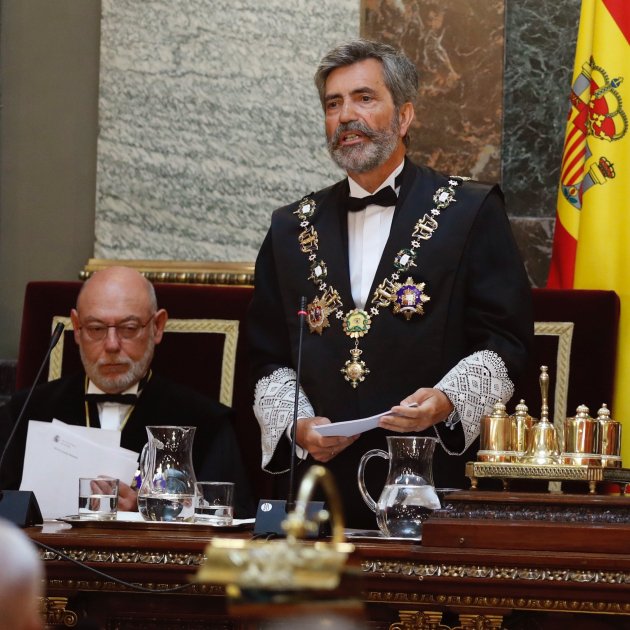The most important week for the sovereignty process has coincided with the solemn opening of the judicial year in Madrid by Spain's Director of Public Prosecutions, José Manuel Maza, who, during his speech, launched a veiled threat against the Catalan government, assuring that the state's public prosecutor would undertake "firm and vigorous" action to preserve the institutions of the Spanish state. Maza was accompanied by the main figures of Spain's judicial system, among them the president of the Supreme Court, Carlos Lesmes, the president of the Constitutional Court, Juan José González Rivas, as well as King Felipe VI and the Minister of Justice, Rafael Catalá.
We "fully guarantee a serene intervention, always following the regulations, but as firm and vigorous as necessary for the preservation of the institutions of the "state of law", which is, as proclaimed by the preliminary part of our Magna Carta [meaning the Spanish constitution], the common and indivisible homeland of all Spaniards", said Maza, addressing the king and those found "on the edges of the law, the state of law and democracy". He warned this last group about the "severe rupture" to the constitutional order of following the unilateral path, seeing the Public Prosecutor's Office to be obligated to deploy an "active defence" of the unity of Spain, "without hesitation".
Maza dedicated more than two of the twelve pages of his speech to denouncing the independence process, although at no time did he name it directly. "The contempt for the legal regulations, in the name of political demands or the will of the people, entails irreparable harm to the healthy functioning of the democratic institutions," he emphasised, denouncing the demands of the Catalan public. At one point, he quoted the philosopher Plato, saying that "the maximum injustice [for Plato] was contempt for the laws". Later, he turned to Cicero, for whom "liberty is submitting to the public laws".
Maza made a reference to his predecessor, Maria Consuelo Madrigal, who last year said that she would deploy "the full weight of the law" against the independence movement. This year, the new head listed all the resources available to them to stop every step which the independence movement wants to take: the Public Prosecutors' Office, the National Audience (Spain's High Court), the Constitutional Court, the Court of Accounts, the Public Prosecutors' Office of "the autonomous community of Catalonia", the Provincial Prosecutors' Offices of Tarragona, Barcelona, Lleida and Girona (the provinces of Catalonia). He emphasised the importance of their actions "in these moments that our nation is going through".
In turn, Lesmes, president of the Supreme Court, read article 2 of the Spanish Constitution, which describes the "indissoluble unity of the Spanish nation", saying that this was in no case "a programmatic frontispiece", rather it was "the ultimate, core and irreducible basis of the whole state of law", evidenced by the premise's positioning at the start of the document. Lesmes pointed out, however, in a subtle allusion to Catalonia, that this did not mean a "standardising wish in questions such as language, culture [and] religion".
The president of the Supreme Court closed his remarks denouncing the referendum and the unilateral action of the Catalan government, saying that "unilateral wills that claim to have the Constitution and that only foresee as a mechanism of preservation something more typical of a break or separation" are "unacceptable and violate the democracy itself, since no democratic principle can protect or legitimise part [of Spain] decreeing for the whole", he said, surrounded by a line-up of authorities and black robes.
